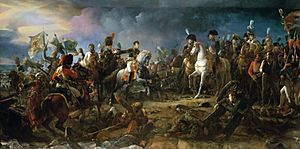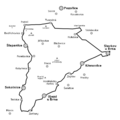Battle of Austerlitz facts for kids
Quick facts for kids Battle of Austerlitz |
|||||||||
|---|---|---|---|---|---|---|---|---|---|
| Part of the War of the Third Coalition | |||||||||
 Napoléon at the Battle of Austerlitz, by François Gérard (Galerie des Batailles, Versailles) |
|||||||||
|
|||||||||
| Belligerents | |||||||||
| Commanders and leaders | |||||||||
| Strength | |||||||||
| 65,000–68,000 (not including III Corps) | 84,000–95,000 | ||||||||
| Casualties and losses | |||||||||
|
|
||||||||
The Battle of Austerlitz was a very important fight during the Napoleonic Wars. It happened on December 2, 1805, near a town called Austerlitz. This town is now known as Slavkov u Brna in the Czech Republic. In this battle, Napoleon Bonaparte led his French army to a huge victory. They fought against the armies of Russia and the Austrian Empire. This battle is often called the "Battle of the Three Emperors." This is because Napoleon, Emperor Alexander I of Russia, and Emperor Francis II of Austria were all involved. Napoleon's win changed the map of Europe. It led to the creation of the Confederation of the Rhine. The famous book War and Peace by Leo Tolstoy also talks about this battle.
Contents
What Was the Battle of Austerlitz?
The Battle of Austerlitz was one of the most famous battles in history. It showed off Napoleon's amazing skills as a military leader. The battle was part of a bigger conflict called the War of the Third Coalition. This war involved several European countries fighting against France.
Who Fought in the Battle?
On one side was the French army, led by Emperor Napoleon. His soldiers were well-trained and very loyal. On the other side were the combined armies of Russia and the Austrian Empire. These forces were led by their emperors, Alexander I and Francis II.
Where Did It Happen?
The battle took place near the town of Austerlitz. This area is in Moravia, which was part of the Austrian Empire at the time. Today, it is in the Czech Republic. The battlefield had hills, valleys, and frozen ponds. These features played a big role in how the battle unfolded.
Why Was This Battle Important?
The Battle of Austerlitz was a huge victory for Napoleon. It had a major impact on Europe.
- End of the Third Coalition: The defeat of the Russian and Austrian armies effectively ended the War of the Third Coalition.
- Treaty of Pressburg: After the battle, Austria had to sign the Treaty of Pressburg. This treaty made Austria give up a lot of land.
- Rise of the Confederation of the Rhine: Napoleon used his victory to create the Confederation of the Rhine. This was a group of German states that were allied with France. It greatly weakened the Holy Roman Empire.
- Napoleon's Power: The battle cemented Napoleon's reputation as a brilliant military genius. It showed his power and influence over Europe.
How the Battle Unfolded
Napoleon used clever tactics to win at Austerlitz. He tricked the Allied (Russian and Austrian) commanders.
Napoleon's Deception
Napoleon made his army look weaker than it was. He also pretended to be unsure and nervous. This made the Allied generals think they had an easy win. They decided to attack the French right flank, thinking it was the weakest spot.
The Sun of Austerlitz
On the morning of December 2, 1805, a thick fog covered the battlefield. As the sun rose, it burned off the fog. This moment is often called the "Sun of Austerlitz." It revealed the Allied armies moving into position.
The Main Attack
The Allied forces moved many of their troops to attack the French right flank. This left their center weak. Napoleon saw this as a chance. He ordered his main force to attack the Allied center. This surprise attack split the Allied army in two.
The Final Blow
With the Allied center broken, Napoleon's forces then attacked the remaining Allied wings. Many Russian and Austrian soldiers tried to escape across frozen ponds. French cannons fired at the ice, causing many to drown. The battle ended with a complete French victory.
Aftermath of the Battle
The Battle of Austerlitz was a crushing defeat for the Allies. They suffered heavy losses.
- Allied Losses: Around 36,000 Russian and Austrian soldiers were killed, wounded, or captured. They also lost many cannons and flags.
- French Losses: The French army had far fewer casualties, with about 9,000 soldiers killed or wounded.
The battle had a lasting impact on Europe. It showed Napoleon's dominance and led to major changes in the political map of the continent.
Images for kids
-
Napoleon with his troops on the eve of battle. Painting by Louis-François, Baron Lejeune
-
Napoleon and Francis II after the Battle of Austerlitz
See also
 In Spanish: Batalla de Austerlitz para niños
In Spanish: Batalla de Austerlitz para niños
 | Audre Lorde |
 | John Berry Meachum |
 | Ferdinand Lee Barnett |












